GCSE preparation and how to start revising
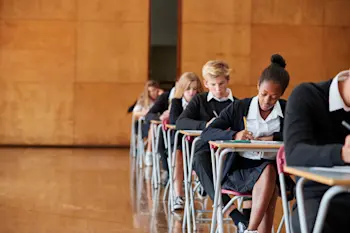
Best revision techniques for GCSE success
We’ve pulled together some tips from our expert tutors to give you the best chance of GCSE success.
GCSEs are a bit stressful, aren’t they? But with a helping hand, they don’t have to be. We have plenty of GCSE resources that can help with your revision sessions.
We want to help you get the GCSE results that you deserve, and take the stress out of exam season. So here are some of our top tips on how to succeed in GCSEs…
Surviving the GCSE years
You might feel like the GCSE years go on longer than the rest of your time at school. There’s a lot to learn and remember before you get to the exam papers.
The GCSE years will eventually pass, and with some good revision techniques and preparation, you’ll get through them with no problem.
Learning environment
The first thing you want to have prepared when you start revising is your learning environment. You need some that’s quiet, calm and ordered. That can be a little difficult if you’ve got brothers and sisters, so get some help from your parents or guardians, ask them to talk to your siblings and give you some space in a quiet part of your home each day.
Make sure you’re eating healthily and looking after your head as well – if you get too stressed, take regular breaks. Don’t over-revise for hours at a time, or the information won’t sink in.
How to Start revision for GCSEs: Learning styles
We all learn differently, and it’s important to start revision in a way that works best for your learning style. There are four main learning types:
Visual
Auditory
Reading/Writing
Kinesthetic
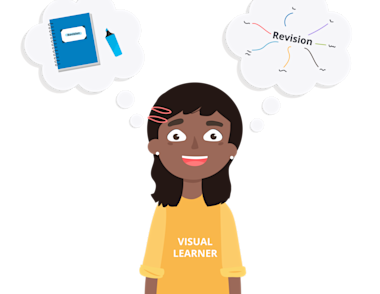
If you’re a visual learner you’ll learn best through visual cues that help you remember information. Use colours in your revision notes to keep things organised and try creating mind maps on specific topics so that you can see the information in a visually exciting way.
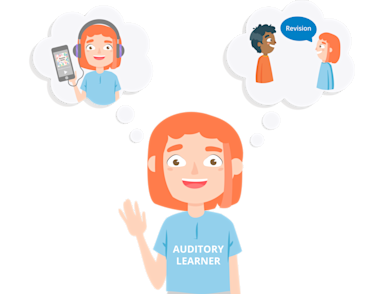
If you’re an auditory learner then the information will sink in best when you talk about it or listen to it. Talk to your teachers, your tutors or your parents/guardians about any topics you might be struggling with and try to have a conversation about it. You could also try recording your revision notes out loud and listening back to them when you revise.

If you learn best through reading and writing, you’ll learn similarly to visual learners. The difference is for you, rather than using diagrams and mind maps, you’re better with notes that are written with headings and paragraphs, and writing out then reading the information back works best for you.
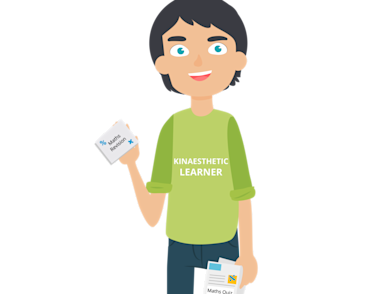
Last but not least, if you’re a kinesthetic learner, you learn best by doing something to engage your learning. So turn your revision into activities that’ll help you learn. Work with your parents/guardians to prepare quizzes and flashcards on the topics you need to learn.
Identifying your learning style is the best way to make sure you’re revising effectively, but you’ll start revising early so that you can figure out which style works best for you.
Best ways to revise for GCSE exams
The best way to get information to stick when you’re doing GCSE revision is to keep to a routine, especially during half terms and holidays! A revision timetable is a great way to stick to a learning routine
In the holiday weeks when you’re not in school, it’s a good idea to make yourself a revision timetable. We know that it can be a little stressful setting up your learning, but luckily we have an exam timetable template to help you.
With this template, you can set yourself times and days to revise specific GCSE subjects and topics that you want to go over.
Top tip! Remember to start revising early, that way you can adjust your exam timetable if you’re struggling to keep up with it.
Revision timetable template
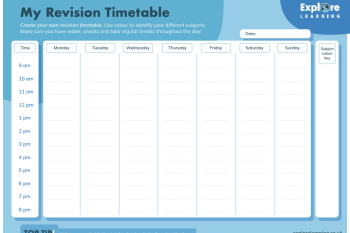
Best ways to succeed with GCSEs
We know you’re anxious to do your best in your GCSE exams, and we have plenty of revision tips and resources that’ll help you succeed with your GCSE revision.
Revise in a way that best suits you, find out what type of learner you are and stick to revising that way
Practice, practice, practice! Use GCSE maths exam past papers to practice with real exam questions to help your prepare
Start preparing for your GCSEs early, it’s never too early to start revising topics you’re not too confident on.
Make a revision timetable
Look after yourself! Exam season is stressful, so make sure you’re getting enough sleep, eating healthily and talking to your teachers, tutors or parents/guardians if you’re getting anxious about GCSEs.
GCSE past papers
Practice makes perfect, so make sure you’re using past papers as a way to practice for your GCSE exams. Below you’ll find each exam board’s past paper finder, so you can look for the ones you need:
Remember to check your answers after you’ve done each past paper to find out where you’re struggling and where to keep working!
Apps for GCSE study
There are plenty of GCSE revision apps out there that can help you prepare for your exams. Be sure to take a look at our favourite GCSE revision apps!
GCSE success: tips from tutors
You’ve probably heard so many revision tips about how to learn and make the information sink in. Sometimes, it helps to think outside the box when it comes to learning. Our Explore Learning tutors have put together some of these top revision tips that you might not have heard of before…
“Whenever I have an exam I make sure to have an exam routine, particularly when you have lots of exams in one go like with GCSEs. Part of this routine is self-care: I have my favourite breakfast on the day of my exams and, if I can I avoid doing any revision on the day of the exam and prioritise staying calm and not over-revising. During the exam, I make sure to practice some breathing exercises and to check in with myself and reassure myself that I can do it.” Hannah Murray
“Here’s a technique to stay calm either if you need help to get to sleep the night before or during the actual exam: draw a figure of eight on your palm with your finger. Concentrate on breathing in when you are drawing the top of the loop and breathing out on the bottom of the loop, keep going until your feel calm.
If breathing techniques are not for you then try pretending you have a lemon in your hands and you want to squeeze every drop of juice from it. Tense up your muscles by scrunching your hands and then let everything relax.
Think about revision as snacking rather than trying to eat a three-course meal! Do it in small, bitesize chunks to help with motivation and retention of information.” Charlotte Gater
“Never leave a question blank! Even if you’re really unsure, any working out at all is better than none. And when revising, resist the temptation to revise the stuff you’re good at! Always prioritise the topics you find trickier.” Tolly Hartley
“Past papers are essential to get used to the style of question for your exam board, leaving time to do them closer to exams can be beneficial so you don’t do them too early and run out.” Daramfon Ekanem
“One thing I think a lot of people don’t realise is that doing exercises and practice questions are still just as useful, even if you’ve done them before. They still test your knowledge in the exact same way, so just because you’ve done a set of exercises before doesn’t mean you can never do them again!” Louise Goswell
A GCSE preparation success story – Eva
Not everyone goes into their GCSEs feeling confident, but with the right help and a little tuition, you could be a GCSE success. Here’s how Explore Learning is helping Eva prepare for her GCSEs:
“After being asked to attend additional maths lessons at school, Eva came home and asked for a tutor. Of course, I agreed and after a fantastic trial session at Explore Learning, Eva couldn’t wait to get started with tuition. She lacks confidence in her learning and doesn’t believe she is capable and the change in her attitude already is outstanding. I’m amazed at how excited Eva is for her lesson each week and after listening to parts of her session, it is so clear how inspired Eva is by her tutor. She is motivated to learn and is starting to really believe that she can do it! Every interaction both myself and Eva have had with Explore Learning has been exceptional. After a recent progress meeting, I am delighted that we found Explore for Eva.” Bethan Onwuka – Eva’s mum
“I really look forward to my sessions with Mya on a Thursday. She is so cool and inspirational and really knows her stuff. She helps me to prepare for upcoming maths lessons at school and I feel so comfortable asking her to repeat things or go over topics that I’ve found challenging.” Eva Onwuka – Explore Learning member
Be your own GCSE success story!
We all need a little bit of help to tap into our potential sometimes, and when it comes to preparing for your GCSE exams, we’re here to help. If you’re struggling with your maths our expert tutors are here to help guide you through the tricky areas and help you revise in a way that works best for you, so why not see how we can help you?
Cancel anytime
No joining fee
In centre or online
Memberships to suit you
Cancel anytime
No joining fee
In centre or online
Memberships to suit you
Cancel anytime
No joining fee
In centre or online
Memberships to suit you




